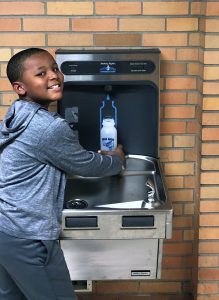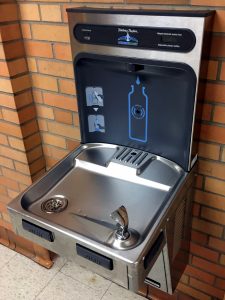Press Release #14/2018-19
FOR IMMEDIATE RELEASE: October 26, 2018
Contact: David Mustonen, Communications Director
(313) 827-3006 MustonD@dearbornschools.org
Dearborn launches District wide effort to reduce plastic water bottles in schools
-Effort also encourages healthy habits and reduced consumption of processed drinks
Beginning in November of 2018, the Dearborn Public Schools will start adding at least one Hydration Station to every school as part of an ongoing effort to be a greener and healthier school district.
Hydration Stations are bottle filling stations that filter and cool water. The stations have a special spout that makes it easier to refill water bottles or other containers. Making it easier for staff and students to refill their own water containers will reduce the number of disposable plastic water bottles being used in the schools.
“These types of fountains are very common in athletic venues and fitness facilities. They provide filtered drinking water, are good for the environment, and may even encourage healthier habits for our students,” commented Dearborn Public Schools Superintendent Dr. Glenn Maleyko.
Supporting a healthier lifestyle is another component in this project and supports the overall effort by the District to take an active role in creating a healthier community including:
- Eight schools are part of a grant that encourages healthier lifestyles for students with more physical activity, better nutrition and even growing their own produce.
- The District was recently recognized for the second year in a row as among the state’s Best and Brightest in Wellness, an award given for promoting healthy lifestyles among employees.
- An increase in recess time for students is included in a new collective bargaining agreement with staff.
Several schools in the District have already purchased and installed Hydration Stations. This coordinated district wide project will support the efforts at the school level and ensure every building has at least one of the new bottle filling stations. The District will invest up to $80,000 to add approximately 40 new Hydration Stations across the district with the first stations being installed as early as November 2018.
Any discussion on water immediately brings to mind the question of water quality coming from the tap. Fortunately in Dearborn, city water enters the schools free of dangerous contaminates. The City of Dearborn continually tests the water it provides and shares those reports with all citizens.
Dearborn Public Schools has been testing water and air quality in buildings for more than 20 years. When a concern is discovered, the District takes immediate action, corrects any possible issues, and works to ensure a safe school environment. In addition, each school has a building engineer, a highly qualified employee responsible for maintaining the HVAC, water, and other safety systems in the building. Most districts do not have this position.
Water testing is not mandated or required. In 2016 the district took a proactive approach to its ongoing voluntary water testing program by hiring an independent company to do a systemic test of 572 of the District’s 4,000 plus water outlets in schools and other district buildings. Throughout the course of the testing, a small number of water taps (23 sinks or fountains) were found to have some elevated level of lead, copper, or both.
“Corrective action was immediately taken at all 23 of these water taps,” Superintendent Maleyko said.
Corrective actions included establishing proper flushing protocols, minor repairs, or complete replacement. Over the next three years, with a total price tag of more than $600,000, the District will continue testing water at the remaining 3,500 water taps located throughout the Dearborn Public Schools. The district has 34 buildings.
According to the Michigan Department of Environmental Quality (MDEQ) and the U.S. Environmental Protection Agency (EPA), the action level for lead in water is 15 parts per billion (ppb) and for copper 1.3 parts per million (ppm) or 1,300 ppb. In 2025 the level for lead is changing to 12 ppb. A way to visualize one part per billion (ppb) is to think of one drop of water in an Olympic size swimming pool.
“Further testing done by the District will use the new standard for lead as the benchmark for taking action and addressing any findings, and our testing protocols will continue to follow the state recommended sampling process,” commented Dearborn Public Schools Director of Safety and Security Dr. Don Ball.
The City of Dearborn has declared 2018 the Year of Health in cooperation with Healthy Dearborn, Beaumont Health, and the Dearborn Public Schools. Dearborn’s program of adding the new Hydration Stations is a proactive approach to ensuring the long term viability of schools and supporting healthy habits for students and staff.
“Our role as a school district is to model good behaviors and reinforce healthy habits while at the same time taking actions that can protect our environment. The addition of the Hydration Stations will be just one more way we can demonstrate these healthy lifestyles to our students,” Maleyko added.
###
Photo Captions-

PR 14 Elem Student HydroSta- Nowlin Elementary student Alonzo Spencer takes a few minutes to refill his water bottle at one of the new Hydration Stations already in place at his school.
PR 
14 Typical HydroSta- The District is investing up to $80,000 to provide at least one bottle filling station at every school.
